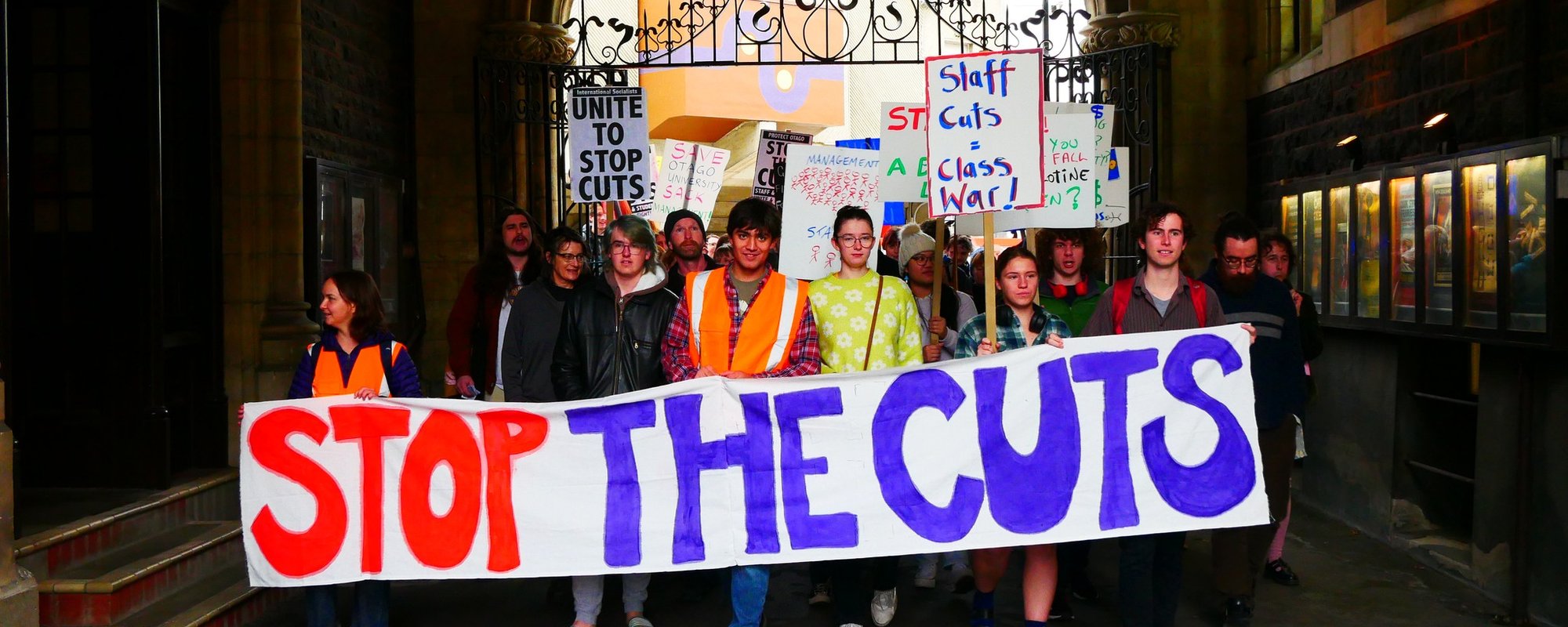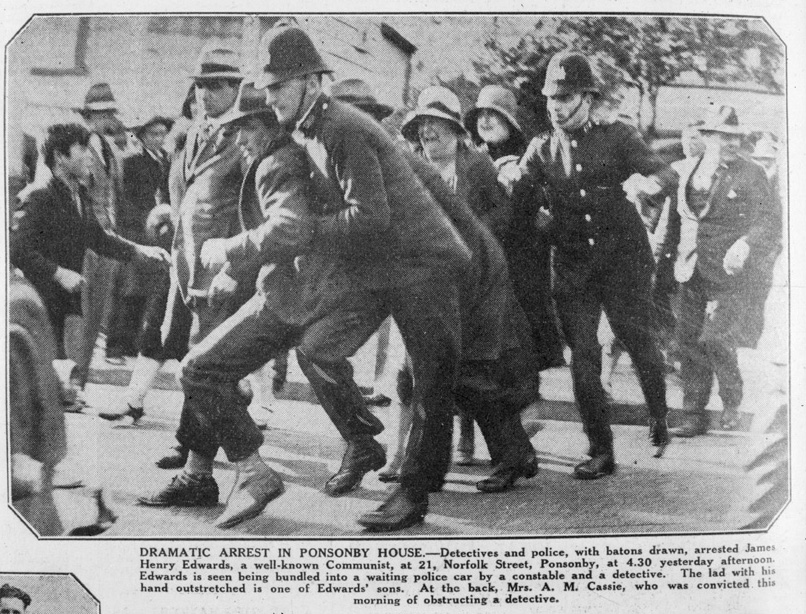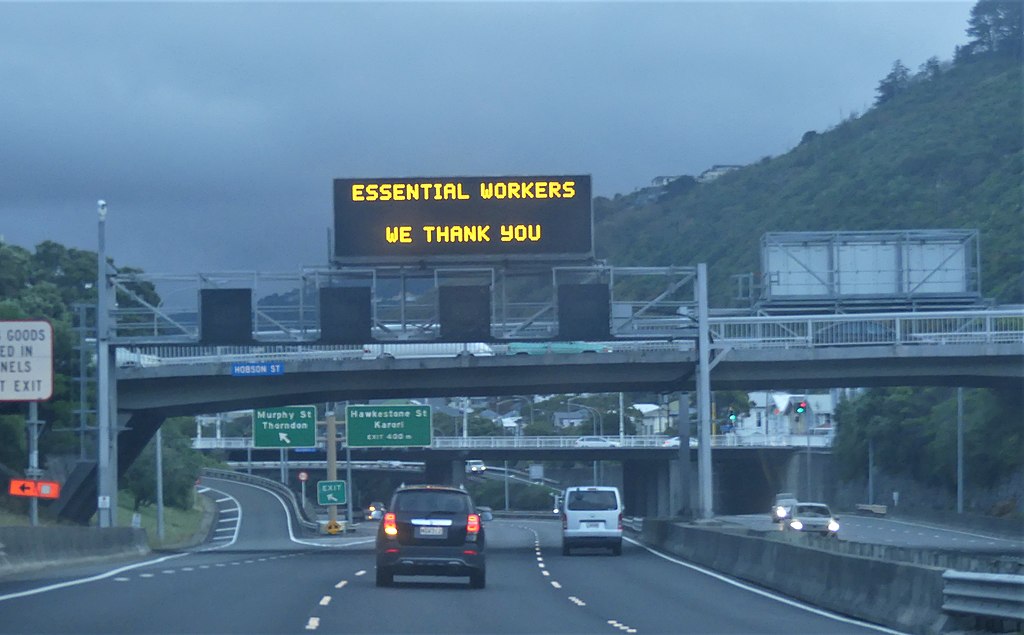Union Hard! This slogan from the locked-out and striking men and women of the Meatworkers’ Union had real meaning over the summer and autumn of this year – for twelve hard weeks they faced off against a company determined to break their union. Talley’s did not manage to do this, and it didn’t manage to force through the dangerous speed-ups it was insisting on. This represents a real victory, not just for AFFCO workers, but for the whole workers’ movement.
Meatworkers made huge sacrifices. In many of the towns where works are located they are the main employer, and so the lock-out meant that whole families were out of work. Talley’s tried to divide whanau, and offered $1000 to people to scab and turn their back on the union. At the start of this dispute we characterised it – along with the strikes in the Ports of Auckland – as part of a bosses’ offensive, a push from the ruling class to try and force through further casualisation in the face of the recession.
But if a week is a long time in politics then what are 12? The Meatworkers’ Union win against Talley’s – combined with the Maritime Union’s stance at the Ports – changes the picture significantly. Instead of two big wins for the bosses – after which they’d have tasted blood – there’s been a small, but important, shift towards our side. Union issues are in the news regularly in a way they haven’t been for years. Networks of militants have been formed through the weeks of fundraising; these will be easier to re-ignite when the next struggle commences. The basic ideas of class struggle unionism – sticking together, fighting for our conditions – have got a hearing. Talley’s didn’t intend any of this, of course, but they’re the result of this dispute.
At the centre of it all are the meatworkers themselves. Their heroism – defying the might of a millionaire’s business empire – inspired many thousands in towns and cities across the country. Their courage in the face of intimidation and corporate thuggery gave real substance to the old slogan ‘Unity is Strength.’ They are an example and inspiration to the rest of us in our unions, and one will need to draw on more and more in the coming months.
The settlement wasn’t without its compromises, of course; the union has accepted urine-based drug testing conditions the company has long pushed for, and there are some moves to casualise. But workers have managed to keep important seniority clauses and conditions for employment across seasons – crucial in their industry – and to win a modest pay increase. Make no mistake, though; this is a victory. Talley’s were going out for a total humiliation of their workforce – that’s why they were content to see them and their children go without for three long months. Instead, they’re the ones wearing the humiliation – the workers have gone back to work keeping most of what they were determined to keep. As union president Mike Nahu told the media, ”The settlement secures the core issues of concern to our members. It retains protection of wages and employment security and ensures workers continue to have their terms and conditions set by a union negotiated agreement.”
What this means for the rest of us
This lockout was part of a wider assault on the rights of all workers in New Zealand. It’s no co-incidence that the AFFCO lockout came at the same time as the Ports of Auckland dispute and strikes at Oceania rest homes. Bosses across New Zealand are looking for ways to make workers pay for money lost during the recession, and hammering down pay and conditions, speeding up the pace of work and making working hours ‘flexible’ is how they want to do it. AFFCO’s own proposal to put new workers automatically on non-union individual agreements is something that the National Party wants to make law for all workers.
One lesson for the rest of us, then, is an old union one: if you don’t fight, you lose. By standing together the meatworkers were able to resist what seemed, often, like an inevitable force ranged against them. Their victory wasn’t certain, to be sure, but it would never have happened if they hadn’t fought.
The rest of the union movement started to re-learn old traditions of solidarity, too. Collections were taken in workplaces and communities, and the union movement collectively donated $50 000 each week. CTU President Helen Kelly based herself around the communities for the duration of the dispute, a more fighting stance than what we’ve seen from the CTU in a while. There’s more that could have been done, and that will need to be done, but this dispute sets good practices in place for the future.
The role of Iwi leaders
It was the intervention of the Iwi Leadership Forum that resolved the dispute – in threatening to withhold stock from Talley’s that spooked them into finally negotiating. Their role, in this dispute, was extremely positive. But it also suggests ambiguities for disputes next time.
This battle was always of particular important for Maori. As CTU leader Syd Keepa explains, “with the meatworks in towns like Moerewa, Wairoa, Horotiu and Whanganui, the majority of affected workers are Maori.” Ngati Kahungunu collected food for locked out workers in Wairoa, and other iwi provided practical help in their areas.
Many of the Iwi Leadership Forum’s negotiating team were close to the workers – Ken Mair has worked as a freezing worker himself. Sonny Tau was a regular on picket lines, and worked in the freezing works in the 1980s too. Iwi members stood by their locked-out whanau, taking collections, offering food, giving support.
But the Leadership Forum’s intervention was also a way of Maori business flexing its muscles. As Tukoroirangi Morgan put it: “The comprehensive agreement ending the ten week lock-out of Horotiu workers is a stunning example of how the growing economic and political power of a determined and united Iwi leadership can produce compromise out of chaos…The job Iwi leaders faced was to get both sides around the table and talking and moving towards compromise and, ultimately, agreement. The truth is that the two parties at the centre of this dispute were locked in a bitter struggle with our people caught in the middle. There was no common ground, mistrust and resentment prevailed”
The forum produced ‘compromise out of chaos’ by seeming to stand above the warring sides. This time around that favoured the workers. But notice how Morgan stresses the ‘growing economic and political power’ of iwi leadership. Their role in this dispute was also about establishing their own political position. How that gets used in future will be interesting to see. It’s a new development in New Zealand industrial relations, and one socialists will need to study very carefully.








